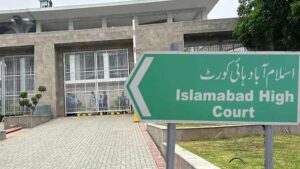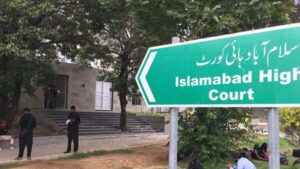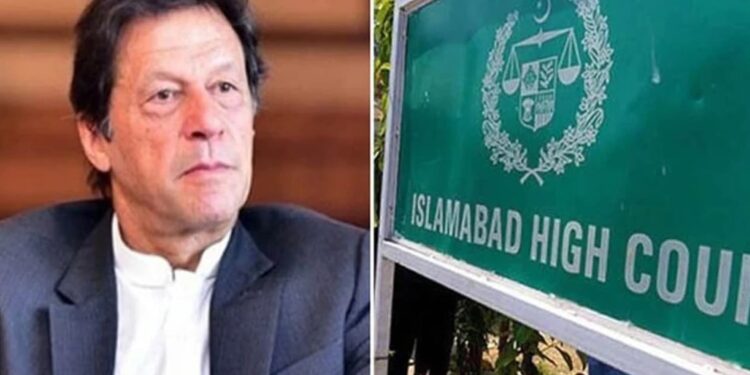In the £190 million corruption case against Imran Khan and Bushra Bibi, IHC opens the door for a verdict. A restraining order that had earlier postponed the pronouncement of a verdict in the £190 million corruption case involving former Pakistani Prime Minister Imran Khan and his wife, Bushra Bibi, was recently lifted by the Islamabad High Court (IHC). The trial is anticipated to end shortly after this order is lifted, and a verdict will probably be rendered soon after.
While some legal actions are still pending, this order stops the trial court from rendering its final decision. This ruling comes after Imran Khan’s legal team petitioned for the inclusion of documents from an earlier National Accountability Bureau (NAB) ruling that had concluded the case.
Imran Khan’s defense lawyer, Barrister Salman Safdar, made arguments before the IHC bench, which is made up of Justices Mian Gul Hassan Aurangzeb and Babar Sattar. Barrister Safdar emphasized that six of the eight people named as suspects in the case, which was first filed by the NAB, are currently unaccounted for.
Furthermore, the accountability court finished cross-examining the prosecution’s witnesses the day before, which was a crucial step in concluding the trial. An important procedural milestone was reached when the defense questioned the last prosecution witness during this cross-examination. The restraining order was first put in place in response to applications filed by Bushra Bibi and Imran Khan, who wanted to be cleared of all accusations. The previous limitations on the court’s decision have now been essentially lifted as the IHC has instructed the accountability court to fully consider these release appeals and render a comprehensive verdict.
There have been legal Arguments and Bench Composition for the Imran Khan Case. Chief Justice Aamer Farooq and Justice Miangul Hassan Aurangzeb were on the IHC division bench that made the ruling. They heard arguments from attorneys on both sides. The attorneys for Imran Khan and Bushra Bibi, Chaudhry Zaheer Abbas, and Muhammad Usman Riaz Gul, presented their last arguments in court.
The Background of Imran Khan’s £190 Million Case

The issue stems from an investigation conducted by Pakistan’s National Accountability Bureau (NAB), which claims that the ex-prime minister of Pakistan participated in a financial transaction connected to a confidential deed in 2019 while serving as prime minister.
NAB claims that this action made it easier for real estate magnate Malik Riaz to get £190 million returned, which had previously been confiscated by the UK’s National Crime Agency (NCA) and shipped back to Pakistan. The NAB claims that Imran Khan and Bushra Bibi received substantial financial perks, including money and land worth billions of rupees from Bahria Town, for “legalizing” these funds.
Nonetheless, Advocate Chaudhry Zaheer Abbas emphasized numerous defense grounds in court. He maintained that some government decisions, including the disputed fund transfer, are protected by law under NAB legislation revisions. He said that there was no hard evidence of wrongdoing and that Imran Khan, the head of the PTI, had no personal financial interest in the deal.
Justice Aurangzeb wanted to know how the Al-Qadir University Trust, which is connected to the disputed monies, was operating. Chief Justice Farooq questioned the defense about the timing of their acquittal filing, speculating that it might have been affected by recent Supreme Court rulings on NAB changes.
The Role of Al-Qadir University Trust in the NAB’s Allegations

Imran Khan and Bushra Bibi were formally charged in early 2024 as a result of the NAB’s thorough investigation into the Al-Qadir University Trust. The money in question, according to NAB, was used to balance a fine imposed on Malik Riaz by the Supreme Court and was part of a broader settlement with Riaz. According to the bureau, Imran Khan and his spouse purchased large amounts of land from Malik Riaz, claiming that this financial and land exchange was inappropriate and created a conflict of interest.
The main focus of the case is an alleged £190 million deal that happened when Imran Khan was prime minister. The NAB claims that money that was intended to be placed in a bank was instead transferred to the Supreme Court’s account. Khan is alleged to have mismanaged or enabled this reallocation, which has sparked concerns about financial abuse.
Nevertheless, the IHC instructed the trial court to thoroughly examine the acquittal petitions filed by Imran Khan and Bushra Bibi as it lifted the restraining order. It is anticipated that the accountability court would shortly release a comprehensive written order outlining the rationale for its ultimate ruling.
Imran Khan’s attorney, Barrister Salman Safdar, stated during a recent hearing that the trial had made significant strides with the cross-examination of 35 witnesses. In addition, Barrister Safdar clarified that Al-Qadir University, which was established under the Al-Qadir Trust, is a legitimate educational establishment and not a “ghost project,” as some detractors have claimed.

To cut a long story short, with different parties expressing opinions on the accountability and openness of previous government transactions, this matter has generated a great degree of public and political interest in Pakistan.
Once the verdict is made public, it could significantly impact Imran Khan’s political destiny and Pakistan’s legal norms relating to accountability and government transactions.
Pakistan is approaching a court decision on one of its most prominent political cases with the IHC’s recent decision to lift the restraining order. The £190 million case of Imran Khan is expected to reach a result shortly.












